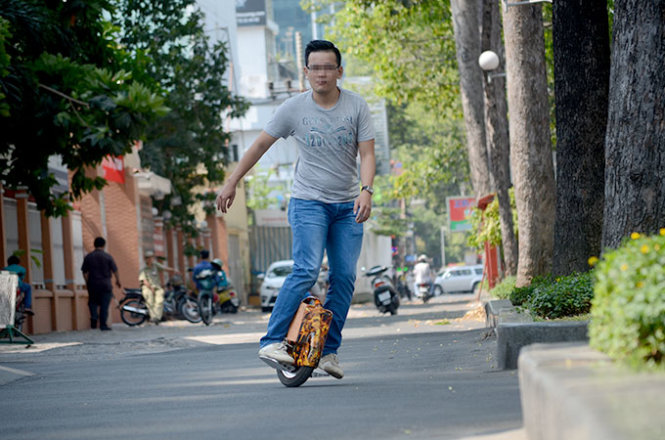In recent times, a number of youths have taken up riding electric unicycles in Hanoi and Ho Chi Minh City for all the novelty and fun that the activity offers.
>> An audio version of the story is available here
A unicycle is a vehicle which touches the ground with only one wheel.
The conventional variation, which is mostly seen in circuses, has a frame with a saddle and is pedal-powered. Meanwhile, the faddish electric unicycles, or solowheels, have only one wheel, no seats and are electricity-driven.
Such vehicles have recently become quite a common sight in parks or less crowded streets in Hanoi and Ho Chi Minh City among those who want others to turn heads.
According to experts on electricity-driven vehicles, solowheels first appeared at a technology fair in the U.S. in 2012.
It was then expected to grow into a popular vehicle which could replace automobiles on short routes to ease traffic congestion, cut down on emissions, and thus help combat pollution.
The first such vehicles were imported into Vietnam some time ago, and soon gained in popularity among local youngsters, though they cost US$1,000-2,000 apiece.
With more supplies from China and Japan, local enthusiasts can now enjoy rides on a unicycle for less than VND10 million (US$466).
Traveling at 20km per hour at most
On a typical Saturday morning, Hoang Van Thu Park in Tan Binh District burst with laughter and chatter from a group of youngsters who are circling around on two solowheels.
Skilled riders demonstrate their flair and show new practitioners how to ride the vehicle.
One of the group members told Tuoi Tre (Youth) newspaper reporters that it typically takes around a week of practice to maneuver a solowheel with relative ease.
The simple solowheels boast only a wheel, two foot resting areas, and a start button.
It is also equipped with a self-balance system and boasts a posture management design which is generally used in the spatial technology.
The vehicle moves forward when riders slightly bend forward, and it will slow down and come to a complete stop if a rider leans backward.
Solowheels can attain a maximum speed of around 20 kilometers per hour, which is equivalent to that of a sport bicycle.
A battery recharge, which takes 30 minutes, allows riders to travel 25 kilometers.
Le Vu Quang Duy, who lives in District 1, Ho Chi Minh City, said that it took him only two hours to learn how to perform basic moves on his unicycle.
Once he maneuvered the vehicle with more ease, he began practicing more technically challenging moves such as spinning and riding it with only one foot.
“I mostly ‘perform’ in my spare time as a hobby only. I think one should wear helmets for safety reasons if they use unicycles as a means of transport,” Duy added.
Meanwhile, Nguyen Xuan Vu, 30, who lives in the city’s Phu Nhuan District, has ridden his solowheel since June last year.
Previously, while he was working in an office, he would often ride the vehicle to his workplace.
“The solowheel, which does not have a high maximum speed, can be used in place of bicycles. I often switch the vehicle off and pick it up to get away from congested street sections, and then resume my rides after that,” he shared.
Vu stressed that many think he rides the solowheel for fun only, but he mostly chooses it to help protect the environment.
A popular means of transport?
Nguyen Le Hoang Khang, director of an import company in Tan Binh District, Ho Chi Minh City, began importing solowheels and registered for exclusive distribution in Vietnam in June last year.
He predicted that the solowheel can serve as a potential alternative means of transport for city-dwellers in the near future as the city’s metro system come into operation.
Commuters can board the urban trains while carrying their solowheels and ride them when they get off the train to get to their destination, Khang surmised.
However, opinions on the prospects of solowheels as a popular alternative means of transport remain mixed.
According to a number of solowheel users, unicycles have yet to grow in popularity as a normal person usually gets fatigued in the legs after riding it for some five kilometers.
The vehicle is thus not ideal for longer routes, they added.
“In my opinion, solowheels are suitable only for strolls in shopping malls and parks, not on roads in Vietnam, which are riddled with frustrating ‘traps.’ Many roads don’t have clear traffic lanes, thus putting solowheel riders in serious peril,” Dung, a Ho Chi Minh City native, said.
He added that in Japan, where he studied, people ride the solowheel mostly for fun and on streets with less traffic.
Many are also put off by the exorbitant prices.
Hoang Hoai Phuong, who lives in Cau Giay District in Hanoi, said he finds the solowheel very inconvenient.
“It’s not easy to stop the solowheel anywhere we want to. My roller skates cost only about VND1 million [$500], and are considerably more mobile and portable than the solowheel,” he explained.
Phuong added he would prefer bicycles when it comes to working out.
Some of his friends are in a frenzy about the solowheel, which they sometimes use for pleasure only.
Bui Duc Hung, a resident in District 12, Ho Chi Minh City, who has just bought a solowheel, said he makes safety the top priority when riding the vehicle.
According to Colonel Tran Thanh Tra, head of the Road-Railway Traffic Police Office under the Ho Chi Minh City Department of Police, solowheel riders can be fined as unicycles are not listed as permitted vehicles based on Article 3 of the Vietnamese Road Traffic Law, which was issued in 2008.
Like us on Facebook or follow us on Twitter to get the latest news about Vietnam!



















































